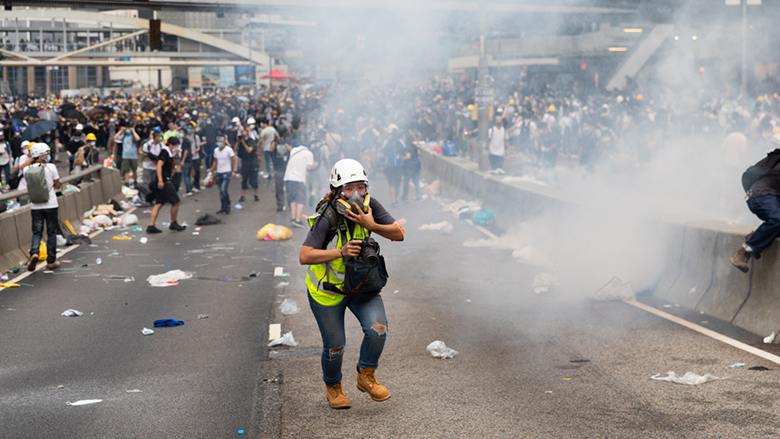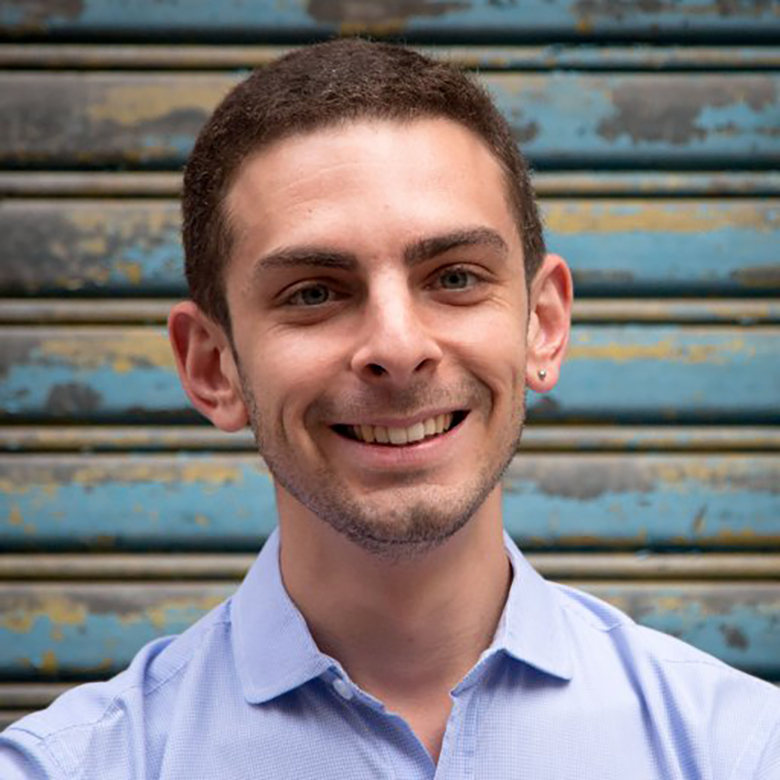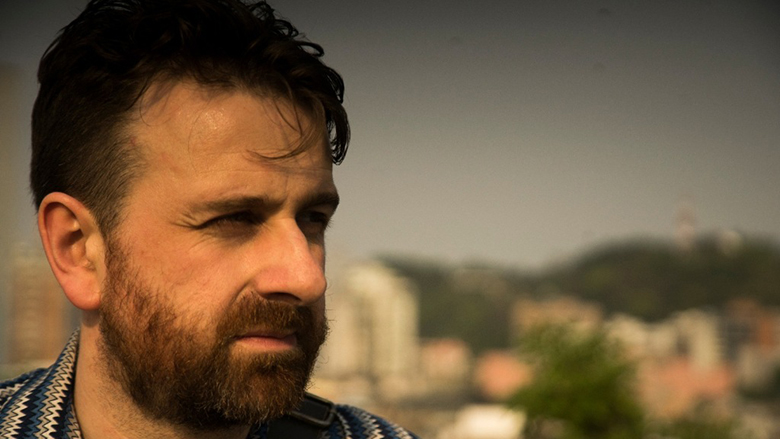Foreign correspondent does not have support from publication under the change of Hong Kong journalism. What is the danger they are facing in reporting?

“I have heard that Hong Kong is known for its high degree of press freedom and freedom of speech even though it has returned to China. It is a city that I always plan to work there.”
The man saying was a leaned and muscular French foreign correspondent, Oliver Farry, who has been working in Hong Kong since 2016. After reporting in Dublin, Paris, and Thailand, this charming and muscular journalist has decided to work in Hong Kong as a frontline journalist at the age of mid-30.
Initially, Farry expected he could enjoy a high level of autonomy and freedom while reporting social issues. It turns out that he did not arrive in the city at the right moment.
“When I first arrived, things were on the verge of breaking out. A couple of pan-democratic representatives were disqualified because of their inappropriate behaviour. Since then, freedom of speech deteriorating rapidly,” said Farry.
After the handover in 1997, Hong Kong had a high reputation for freedom of speech and press freedom. This image also gives the international a belief that the Chinese government has exercised the promise of ‘One country, two systems’ for 50 years in the right direction.
Ever since President Xi JingPing becomes the leader of the communist party, press freedoms in Hong Kong are noticeably being suppressed within a short time. News about local television broadcast stations have to self-censored themselves in reporting, pro-democracy journalists were being arrested and pro-democracy publication was forced to shut down is not uncommon any more. This news had changed the impression of Hong Kong that used to have a high level of press freedom among international countries.
Eli Meixler, a young clean shaved foreign correspondent, has been working in The Financial Times in Hong Kong for 4 years since graduated. Ever since he arrived in the city, he has been warned to be careful of his speech in reporting under the current political environment.
“The current situation is that only one political viewpoint is deemed to be acceptable by the authorities, and where a government faces no credible political opposition or threat to the popular transfer of power. This is incredibly dangerous for press freedom,” said Meixler.
The side of the local press that is antagonistic towards the local government or the Chinese governments has been mostly muzzled or intimidated, legally, and financially, out of the marketplace, while its rival on the “pro-government” side continues to enjoy broad commercial support and official sanction.
The imbalance of political orientation in the press environment has left foreign correspondents uncertain on which direction that they should work towards to maintain a healthy and balanced press environment.
Farry said, “Compared to local journalists, formal freedom of foreign media and journalists operating in Hong Kong are still guaranteed in reporting critically, in particular on the government.”
With the government raising the prospect of ‘fake news’ laws to exercise further control over how the media operates. Farry worries the situation for the press in Hong Kong will continue to mirror more closely that on the mainland and this freedom will not be guaranteed in the future.
“The impunity of the police in its handling of journalistic since the protests and the government’s lack of responsiveness of media interview requests has made the atmosphere for journalism less favourable,” said Farry.
Despite Hong Kong journalism has maintained a high level of press freedom since the handover, Meixler sees that the intervention of government into press freedom is predictable.
He explained free press appears in every diplomatic society, and it is a problem that government tries to solve. “Government that is unwilling to tolerate the prospect of legitimate political dissent is unlikely to tolerate an independent and critical press and will seek to limit its ability to operate.”
When the government started to see press freedom as a problem, the only way to get rid of this press freedom is to increase interference and give press pressure for local publication by removing certain types of books inside the library and book fair.
Meixler says, “Loss of the role of oversight such a press can play is a grave threat to the survival of a free society.”
The foreign correspondent was being shot closely in the eye with a rubber bullet when reporting the anti-extradition movement in 2019. Some correspondents were mistaken as protesters because of wearing protective gear during protests and being barked at by police.
The situation had raised international awareness of foreign correspondents’ safety when reporting in Hong Kong. The Financial Times had stopped sending correspondents to Hong Kong to report live on the protest.
Indeed, Farry does not think that the current situation in Hong Kong is the worst that he had experienced in his career as a frontline journalist. While working in other countries, he had been sent to the hospitals on several occasions because of an injury in filming the protests.
“Compared to protests in Europe, Middle East or elsewhere in Asia, both on the side of protestant and police were far less. It might be a worse situation for Hong Kong but not the worst compared to other countries,” said Farry.
“For all the deteriorations of press freedom in Hong Kong, things aren’t as physically dangerous for journalists as they are in other countries, such as Mexico, Egypt or Russia.”
Farry remembered the situation has changed worse was after the National Security Law has established. As a foreign correspondent, he does not have clear understandings of how the law is going to work. With no guidelines from publication, he was all alone and it can be safe but also in danger.
He explained foreign correspondent is just like an invisible identity in the society, the public will just think they are the visitors and being welcomed. Once they are in danger, no one can provide help instantly.
After the National Security Law, the biggest impact to Farry was spending more hours editing the video to ensure the pro-democracy protesters were not identifiable in the interview with them. Besides that, he had to avoid the content crossing the grey area of the National Security Law at the same time can convey the message to his audience.
“The only thing that I can do is to avoid infringing the National Security Law through professional ethics generally make that easy to do,” said Farry. “However, the authorities have the scope to decide whether you have broken the law so, in the long run, there is not much can do.”
After the National Security Law, some foreign correspondents’ working visas were being denied. Though no reasons were officially given, it is believed that visa issues will increasingly become a problem under the trajectory of the current political situation as a warning.
Meixler says, “Journalist’s nationality was not the issue in the current situation, but that said one’s nationality might become a factor in visa refusals in the coming year. Visas for journalists are certainly becoming weaponised, and it is the most convenient way for the authorities to serve retribution on foreign media.”
With the uncertainty in visa issues in the future, some foreign correspondent has chosen to leave Hong Kong before things get worse. Foreign publications such as The New York Times relocated their staff to another Asian city.
Both Meixler and Farry have given serious thought to leaving Hong Kong, they think that the best days of media freedom in the city are probably behind them. Despite the situation in Hong Kong is not favourable at the moment and it is far beyond their expectations, they do not have an immediate plan to leave.
Meixler said, “Hong Kong is one of the biggest, most important, and most interesting news stories in the world right now, and as a journalist, there is of course an impulse to be close to it and part of covering it.
“After all, someone had to, for the world to remain informed about it, and journalists must continue to operate in places that are a bit less than ideally stable.”
Farry believes that the risk to foreign correspondents has been reasonably minimal than the local journalists have suffered beyond possible visa refusals. It is known that foreign correspondents are pro-democracy, people that sympathize might lie with the Chinese government are generally not hostile to foreigners.
Farry said, “With its so-called wolf warrior diplomacy, China has shown it cares for less its international image now when domestic stability, so coverage in the foreign press is not going to be too much of a concern for the authorities here.
“There might come a point when the Chinese government decides to encourage social media harassment campaigns against foreign journalists in Hong Kong, as is currently happening on the mainland, but those would have little prospect of being successful in Hong Kong,” said Farry.
Meixler thinks the only thing that a foreign correspondent can do is to enjoy the minimum level of press freedom before the day that he would no longer feel secure working here and expect to leave instead of worrying about his future career.
Perhaps professionals, like Meixler, would still try their best to fulfil the journalist’s responsibility in showing the truth to his reader.
“This is the only thing that I can control on my own.”

